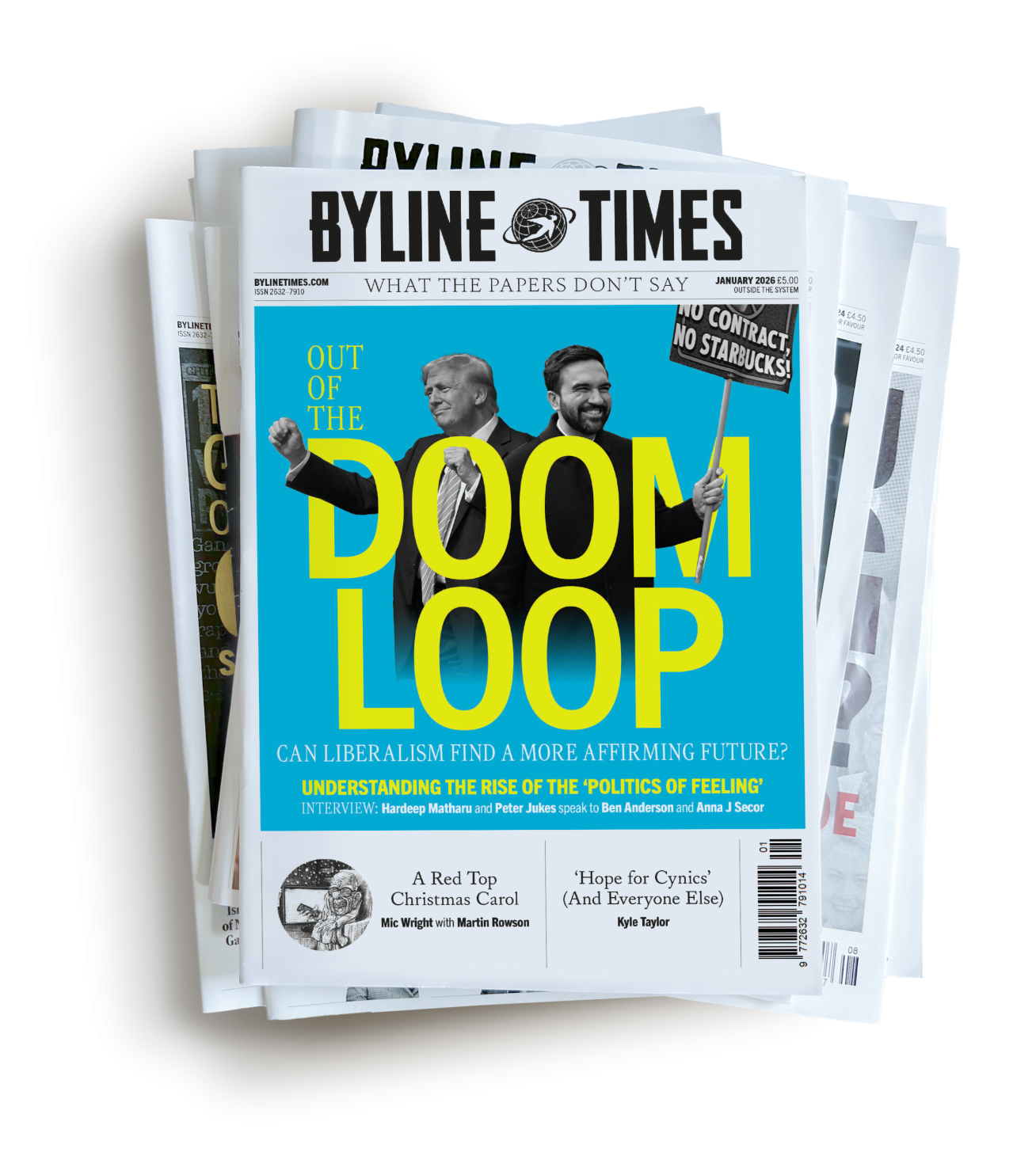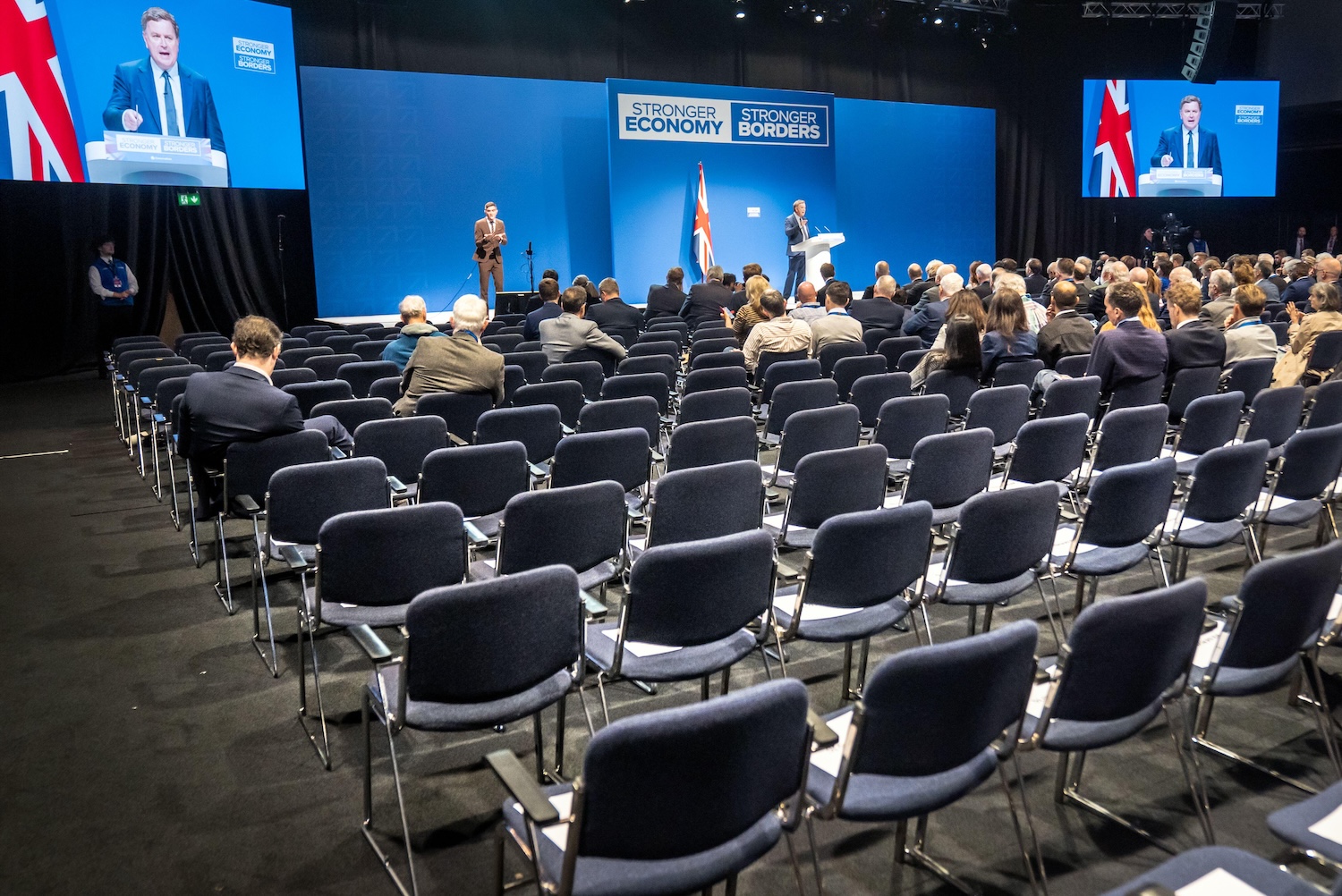
Read our Digital & Print Editions
And support our mission to provide fearless stories about and outside the media system
Having heard about my dear old party losing yet another set of marbles, this time deciding to ban journalists (including Byline Times) from its party conference this year, I felt it was my duty to provide some ‘insider’ coverage of what actually happened there.
So, what was the party trying to hide? For a start, the conference centre was very sparsely filled. At times you could literally hear wind wailing through it. The Manchester venue offers two conference halls next to each other, seating 2,000 people each, which can be, as in the past years, be put together around one stage. This year they were unused. A small auditorium with just 700 seats was prepared for the biggest event of the conference on Wednesday morning – the Leader’s Speech.
In the 1980s, Margaret Thatcher faced conference halls seating 3,000-4,000 at least, in Brighton, Blackpool and Bournemouth. In 1983, some 5,000 Conservative representatives descended on Blackpool. The scale has shrunk and so has the confidence.
Policy Vacuum
If the conference centre felt empty of people, so too did it of ideas. This is hardly surprising given there has not been any serious work done on policy for years.
Under Johnson, policy became fungible and vague. His slogan “Get Brexit Done” boxed the party into populist single issue politics with simple solutions, in contrast to the complex and hard policy work required for parties to win elections in true liberal democracies. There has already been academic work that explored this astonishing phenomenon. For example, in his essay “Conservative Party Statecraft and the Johnson Government,” Hayton argued that Brexit was repurposed as the organising narrative at the expense of substantive governance and so it has proved.
Meanwhile, successive party leaders have seemed too scared to ditch immigration as our main obsession, despite its total irrelevance to the electorate’s central concern: the state of the economy. If you ask leading economists to come up with the top ten reasons for Britain’s economic problems, immigration will not feature in any of them. Some of the long-term weaknesses originate as far back as the global financial crisis of 2008. Some, like Brexit, are more recent. On that basis, the Conservatives could have used their superior economic experience to destroy Reform UK’s platform completely. But they do not: the pull of far-right populism and the illusions of easy election gains are still far too powerful.
Past Glories
In the exhibitors’ space at the Manchester conference, three of Margaret Thatcher’s three outfits hang behind the glass like old skins, reminding the Party of its metamorphosis into something quite unrecognisable. Her success was built on hard-won policy victories, the result of long days (and nights) spent testing her ideas in argument with other politicians, economists, and experts.
Before launching her famous Monetarist Medium-Term Financial Strategy (MTFS) in 1980, Thatcher personally worked with the legendary economist Milton Friedman and her chief economic adviser Sir Alan Walters. She then forced it through against “wet” Conservatives such as Jim Prior and Ian Gilmour, who attacked the money-supply fixation in early-1981 debates.
The Right-to-Buy was designed in Keith Joseph’s Centre for Policy Studies with Thatcher and her ministers seeing off Conservative rebel attempts to water it down
The “Big Bang”, the deregulation of the financial services industry and opening the City of London to international banks in 1986 was driven by Nigel Lawson and Cecil Parkinson. Despite the City’s protectionist resistance, who wanted to keep fixed commissions and single-capacity dealing, the Government backed the Bank of England’s liberalisation timetable and abolished the cartelised rules in one stroke.
All that attracted the heavy-weight intellectual elite and professional middle classes to Thatcher’s Conservatives. In contrast, this year the crowd seemed more attracted by the populist narratives of fighting the “deep state” and “elites”. There were fewer grandees elbowing for fringe seats, and more punters for whom “take our country back” and variations on supremacy and exceptionalism still passes as policy.
A Populist Echo
In the age when Jeremy Paxman and John Humphrys were the undisputed kings of political interviewers, such a lightweight agenda would not have had an easy ride. But that time is long gone. Some previously straight-bat journalists now front shows on channels built for virality first, argument later. One of my old friends at the conference, who was previously a perfectly good political journalist on The Times and The Telegraph, is now one of the more recognisable voices on the populist right, commanding the kind of salary that journalists would have no hope of earning at the more respectable end of the media circus. Some of the more prominent media personalities like Piers Morgan and Nigel Farage earn millions, tens of millions each year.
Welcome to the age of “Tik Tok politics” – big online, but with no real following to actually fill a real-world party conference. To me, it speaks of something profound about the limits of British populism. The “anti-elite” pitch still draws attention but populist energy flares hot and brief. It struggles to transform itself into real policy with long-term, sustainable solutions, discipline or trust.
Thatcher’s Conservatives, by contrast, combined conviction with competence, always welcoming debate and scrutiny as tools of effective policymaking.
If Conservatives want to win again, they must relearn that lesson: credibility before crowds, ideas before image, and patience before performance. The emptiness of these halls is more than visual. It is moral and intellectual. Only a party prepared to think, to govern, and to be challenged, can fill them again.
